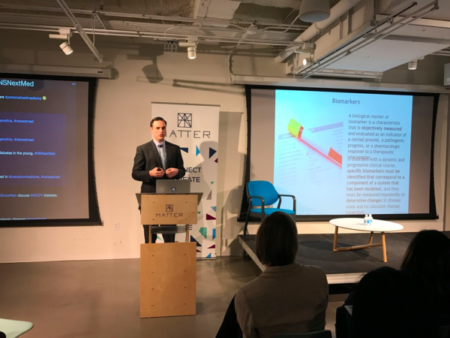Solving Chronic Disease with Data
Genomic technologies have become effective and affordable tools for detecting and diagnosing chronic disease, yet they are still uncommon in clinical settings. Drs.Laura BillingsandMark Haupt, who recently presented at MATTER, are on a mission to change that. They joined us for the latest program in our “Healthcare for What’s Next” series, which MATTER produces with NorthShore University HealthSystem. Watch the full event here:
Billings, research program director in diabetes at NorthShore, is a leading expert in Maturity-Onset Diabetes of the Young (MODY). MODY is a monogenic disease (i.e. caused by a mutation in a single gene), making it a prime candidate for detection through genetic testing. Despite this fact, 80% of people with MODY are misdiagnosed as having type 1 or type 2 diabetes.
This high rate of misdiagnosis occurs, Billings said, for a variety of reasons, including inadequate screening criteria, lack of provider awareness, ethnic differences in referral rates (a result of implicit biases), and the cost of genetic testing. The error comes at a high price: while MODY can be managed with oral medication or no medication at all, a misdiagnosed patient may be unnecessarily subjected to insulin shots and other intensive therapies.
To improve detection and diagnosis of MODY, Billings is leading the FIND MODY study, which leverages data from NorthShore’s electronic medical records (EMR) to identify patients at high risk for the disease. These patients are invited into the clinic for genetic testing to confirm the diagnosis.

While most chronic diseases result from complex interactions between multiple genes, as well as environmental factors, Billings believes that researching MODY is an important first step in understanding how EMR systems and genomic technologies may one day be applied to complex chronic diseases, like type 2 diabetes.
“Knowing the tip of the iceberg lets us know what’s underneath,” said Billings.
Dr. Haupt is exploring what’s underneath the iceberg. As chief medical officer of Ariel Precision Medicine – a MATTER member company – Haupt is on a mission to deliver precision medicine to patients with complex chronic diseases, such as chronic pancreatitis.
Chronic pancreatitis is inflammation of the pancreas that does not improve or heal, triggering acute episodes of pain in affected patients. When diagnosed early, pancreatitis can be managed – but the later the diagnosis falls in the disease progression, the more difficult it is to do so. Using targeted gene sequencing and machine learning, Haupt is building a predictive model that will allow clinicians to diagnose – and thus treat – pancreatitis earlier.
“As we’re able to intervene earlier in chronic diseases – whether through therapeutics or lifestyle modifications – we can have a huge impact on patients and the healthcare system,” said Haupt.
For genomic medicine to achieve its full promise, finding ways to educate and engage physicians in the clinical application of genomic technologies is key. Haupt noted, “Otherwise, it’s going to sit in the lab and never improve the lives of patients.”


